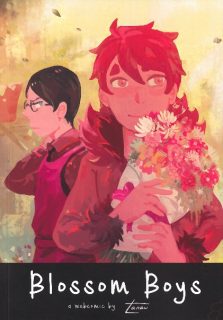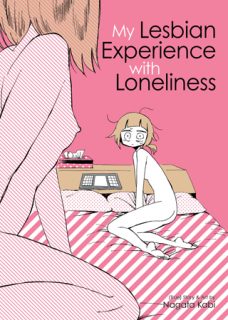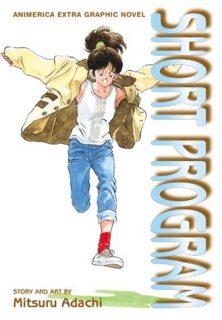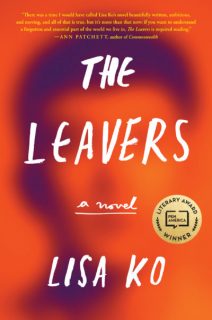My News and Reviews
It’s been couple of months since there’s been an in-depth review here at Experiments in Manga (I mostly blame TCAF 2017), but last week I was very pleased to write about Yeon-sik Hong’s award-winning manhwa Uncomfortably Happily which was just released by Drawn & Quarterly this past Tuesday. It’s an engrossing and relatable memoir about the time Hong and his wife moved from the city of Seoul to the countryside of Pocheon. Normally I would have posted May’s Bookshelf Overload last week, but because I wanted to feature Uncomfortably Happily close to its release date, I’ll be posting it later this week instead.
As for other interesting things to read online, The OASG interviewed a few cosplayers about their opinions on Yui Sakuma’s Complex Age, a manga in which cosplaying takes a very important role. (I’ve fallen a little behind in reading the series, but the first volume in particular left a huge impression on me.) Matt Thorn’s blog, which had been dormant for so long, has a couple of new posts now, too: Before the Forty-Niners takes a look at the early history of shoujo manga while Who’s to Judge Tezuka’s Rivals? delves into even more shoujo manga history by looking at some of Osamu Tezuka’s contemporaries.
Quick Takes
 Blossom Boys by Tanaw. I don’t exactly remember how I came across Blossom Boys, but it may have been thanks to one of Tanaw’s Yuri!!! on Ice fanworks. Tanaw is an illustrator and comics creator based in the Philippines. Blossom Boys had its start as part of a webcomics class that Tanaw decided to take and was finished a year later. It’s a charming boys’ love story that is earnest, adorable, sweet, and even a little surprising. Reese is a university student who wants nothing more than to be loved. He’s desperate for someone to ask him out–it doesn’t really matter who they are or what their gender is–and so he is ecstatic when he unexpectedly receives a bouquet of flowers in the middle his math class. Thus begins Reese’s endearingly awkward relationship with Prince, a florist whose peculiarly stern demeanor is the complete opposite of Reese’s bubbly personality. Although Blossom Boys does have an overarching story, many of the individual chapters can be fairly episodic. Tanaw also experiments with different illustration styles, palettes, and techniques over the course of the comic. What holds Blossom Boys together instead is its delightful characters and sense of humor. I enjoyed the comic a great deal and I’m glad to have found it; I would definitely be interested in reading more of Tanaw’s work.
Blossom Boys by Tanaw. I don’t exactly remember how I came across Blossom Boys, but it may have been thanks to one of Tanaw’s Yuri!!! on Ice fanworks. Tanaw is an illustrator and comics creator based in the Philippines. Blossom Boys had its start as part of a webcomics class that Tanaw decided to take and was finished a year later. It’s a charming boys’ love story that is earnest, adorable, sweet, and even a little surprising. Reese is a university student who wants nothing more than to be loved. He’s desperate for someone to ask him out–it doesn’t really matter who they are or what their gender is–and so he is ecstatic when he unexpectedly receives a bouquet of flowers in the middle his math class. Thus begins Reese’s endearingly awkward relationship with Prince, a florist whose peculiarly stern demeanor is the complete opposite of Reese’s bubbly personality. Although Blossom Boys does have an overarching story, many of the individual chapters can be fairly episodic. Tanaw also experiments with different illustration styles, palettes, and techniques over the course of the comic. What holds Blossom Boys together instead is its delightful characters and sense of humor. I enjoyed the comic a great deal and I’m glad to have found it; I would definitely be interested in reading more of Tanaw’s work.
 My Lesbian Experience with Loneliness by Kabi Nagata. Before it was picked up by a manga publisher, Nagata released the majority of My Lesbian Experience with Loneliness on Pixiv. The manga is an autobiographical and very personal account of Nagata’s struggles with her mental wellness and sexuality. My Lesbian Experience with Loneliness is a powerful work which has been met with well-deserved acclaim. Nagata is forthright, frankly portraying her experiences in a way that is both accessible and disarming. Even though the subject matter is quite serious (self-harm, eating disorders, anxiety, and debilitating depression are all discussed), the pink-hued artwork in the manga is actually rather cute. My Lesbian Experience with Loneliness outlines a turning point in Nagata’s life. On the verge of giving up on life, feeling so incredibly isolated and alone, Nagata makes the impulisve decision to hire a lesbian escort. Ultimately the whole affair doesn’t really solve any of Nagata’s problems and even amplifies some of those that already existed, but it does encourage her to look critically at who she is and the source of her suffering. That’s the story that Nagata captures in My Lesbian Experience with Loneliness and the story with which so many readers have found they could identify. Admittedly and understandably, it’s not always an easy read, but it is a very good one.
My Lesbian Experience with Loneliness by Kabi Nagata. Before it was picked up by a manga publisher, Nagata released the majority of My Lesbian Experience with Loneliness on Pixiv. The manga is an autobiographical and very personal account of Nagata’s struggles with her mental wellness and sexuality. My Lesbian Experience with Loneliness is a powerful work which has been met with well-deserved acclaim. Nagata is forthright, frankly portraying her experiences in a way that is both accessible and disarming. Even though the subject matter is quite serious (self-harm, eating disorders, anxiety, and debilitating depression are all discussed), the pink-hued artwork in the manga is actually rather cute. My Lesbian Experience with Loneliness outlines a turning point in Nagata’s life. On the verge of giving up on life, feeling so incredibly isolated and alone, Nagata makes the impulisve decision to hire a lesbian escort. Ultimately the whole affair doesn’t really solve any of Nagata’s problems and even amplifies some of those that already existed, but it does encourage her to look critically at who she is and the source of her suffering. That’s the story that Nagata captures in My Lesbian Experience with Loneliness and the story with which so many readers have found they could identify. Admittedly and understandably, it’s not always an easy read, but it is a very good one.
 Short Program, Volumes 1-2 by Mitsuru Adachi. My introduction to Adachi’s work was through the baseball manga series Cross Game and its anime adaptation. I only recently discovered that Adachi’s first manga to be translated into English was actually Short Program. The series is a collection of short manga taken from a variety of magazines from all of the major demographics (shounen, shoujo, seinen, and josei) spanning from the late 1970s to the early 2000s. Viz Media only ever published the first two volumes of Short Program; it would have been nice to have seen the rest of the series released as well, but since the stories are largely unrelated to one another, at least it’s not like readers will be left with a cliffhanger or otherwise unresolved narrative. For the most part, the short manga of the first two volumes of Short Program are quirky romances, often with twist endings that add a little surprise to what would otherwise be fairly straightforward and even mundane stories. Adachi successfully works within a number of different genres in Short Program–some of the stories are comedies while others are thrillers, some are unabashedly romantic while others are intentionally disconcerting. Overall, Short Program is a solidly engaging and consistently entertaining series.
Short Program, Volumes 1-2 by Mitsuru Adachi. My introduction to Adachi’s work was through the baseball manga series Cross Game and its anime adaptation. I only recently discovered that Adachi’s first manga to be translated into English was actually Short Program. The series is a collection of short manga taken from a variety of magazines from all of the major demographics (shounen, shoujo, seinen, and josei) spanning from the late 1970s to the early 2000s. Viz Media only ever published the first two volumes of Short Program; it would have been nice to have seen the rest of the series released as well, but since the stories are largely unrelated to one another, at least it’s not like readers will be left with a cliffhanger or otherwise unresolved narrative. For the most part, the short manga of the first two volumes of Short Program are quirky romances, often with twist endings that add a little surprise to what would otherwise be fairly straightforward and even mundane stories. Adachi successfully works within a number of different genres in Short Program–some of the stories are comedies while others are thrillers, some are unabashedly romantic while others are intentionally disconcerting. Overall, Short Program is a solidly engaging and consistently entertaining series.
 The Leavers by Lisa Ko. Although Ko has written numerous short stories and essays, The Leavers is her debut work as a novelist and the winner of the 2017 PEN/Bellwether Prize for Socially Engaged Fiction. It’s a particularly timely novel, too, examining the impact of illegal immigration on the families both directly and tangentially involved. The Leavers follows two entwined lives, alternating perspectives between them. First there is Deming, a young man who has yet to find his place in the world. After his undocumented mother Polly suddenly disappears when he is eleven, Deming is fostered and adopted by a white couple who rename him Daniel, never knowing what happened to her. The second is narrative is that of Polly herself, telling the story of her background, how she came to the United States from China, and eventually what really happened to her before and after she was gone from her son’s life. The Leavers is in turns compelling and tedious, engaging and exasperating. The issues explored are important ones, but the telling of the character’s stories, especially Deming’s, can sometimes be frustratingly unfocused. Granted, this may also be a deliberate reflection of Deming’s own obscured state of mind.
The Leavers by Lisa Ko. Although Ko has written numerous short stories and essays, The Leavers is her debut work as a novelist and the winner of the 2017 PEN/Bellwether Prize for Socially Engaged Fiction. It’s a particularly timely novel, too, examining the impact of illegal immigration on the families both directly and tangentially involved. The Leavers follows two entwined lives, alternating perspectives between them. First there is Deming, a young man who has yet to find his place in the world. After his undocumented mother Polly suddenly disappears when he is eleven, Deming is fostered and adopted by a white couple who rename him Daniel, never knowing what happened to her. The second is narrative is that of Polly herself, telling the story of her background, how she came to the United States from China, and eventually what really happened to her before and after she was gone from her son’s life. The Leavers is in turns compelling and tedious, engaging and exasperating. The issues explored are important ones, but the telling of the character’s stories, especially Deming’s, can sometimes be frustratingly unfocused. Granted, this may also be a deliberate reflection of Deming’s own obscured state of mind.
